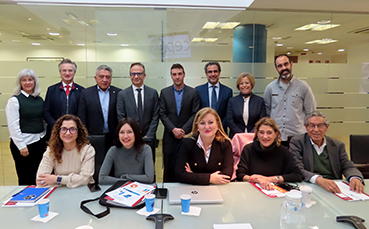 On February 23, CIRIECSTAT held its annual meeting of the Scientific and Advisory Council at the CEPES headquarters in Madrid. Presided over by Professor José Luis Monzón, alongside CIRIECSTAT director Professor Ángel Soler, the meeting was attended by a dozen Council members who discussed the latest advancements and developments of the Social Economy Statistical Website of CIRIEC-Spain.
On February 23, CIRIECSTAT held its annual meeting of the Scientific and Advisory Council at the CEPES headquarters in Madrid. Presided over by Professor José Luis Monzón, alongside CIRIECSTAT director Professor Ángel Soler, the meeting was attended by a dozen Council members who discussed the latest advancements and developments of the Social Economy Statistical Website of CIRIEC-Spain.
In his presentation, Ángel Soler reported that the CIRIECSTAT team is concluding work on a new statistical product within the realm of historical series of the social economy. This will involve the implementation of an interactive tool on the statistical website, allowing researchers and the public to perform their own queries to generate specific data sets in table form.
According to Ángel Soler, “the goal is for users to choose the Autonomous Communities or provinces they are interested in, as well as the time frame and output format of the selected information, such as a spreadsheet, text, or HTML.”
During the meeting in Madrid, a test demonstration of this product was conducted, which will be available to the public and researchers in the coming weeks.
National accounting methodological criteria
Professor José Luis Monzón reiterated that the objectives of CIRIECSTAT are to implement a system for collecting and producing Social Economy statistics, visible on a single portal. The aim is to become a database that permanently and continuously aggregates, purifies, and publishes various Social Economy statistics in Spain. This information system is governed by national accounting methodological criteria to ensure the data is homogeneous and comparable.
The portal also serves an educational function for students and non-experts in economics, as CIRIECSTAT provides definitions and a glossary of concepts that facilitate the understanding of the published figures and their importance.
Support for the development of regional statistical websites
During the meeting, participants celebrated CIRIECSTAT's progress and presented some statistical website projects being developed at the regional level, following CIRIECSTAT’s example and methodology. These include projects in Galicia, Castilla-La Mancha, and Euskadi, which are in various stages of development.
In the Valencian Community, VALESTAT has existed for two years, directed by IUDESCOOP of the University of Valencia through Professor Rafael Chaves. Like CIRIECSTAT, it uses the same methodology to offer social economy figures focused on the Valencian regional scope.

